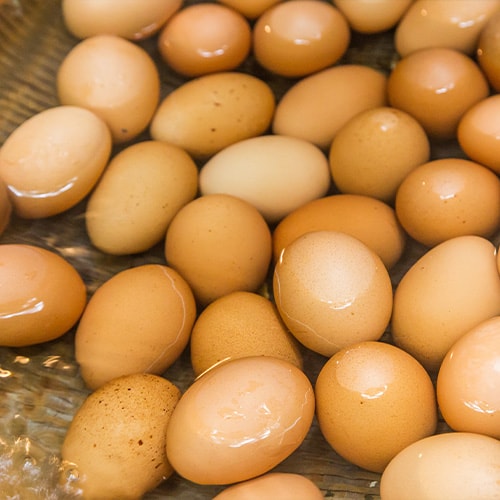What Are Pasteurized Eggs?
Last updated on Nov 5, 2025Val GoodrichIf you make a lot of your sauces or desserts in-house, then you know that many recipes call for raw or partially cooked eggs. It’s easy to whisk in egg yolks for mayonnaise without a second thought, but consuming uncooked eggs can be risky due to the potential presence of harmful bacteria like Salmonella. That's where pasteurized eggs come in.
Pasteurization is the process of gently heating food just enough to kill off any bacteria that could cause a food-borne illness. It's commonly used in the food industry to make products like milk, wine, and eggs safe to consume.
How Are Eggs Pasteurized?

Pasteurizing eggs involves submerging eggs in warm water baths that are carefully time and temperature controlled. This process destroys any bacteria that may be present without cooking the eggs. You can use a sous vide machine to pasteurize eggs while keeping them in a raw state before incorporating them into mayonnaise. No matter what process is used for egg pasteurization, it must be approved by the United States Food and Drug Administration (FDA). This means pasteurized eggs are safer in recipes that call for uncooked or partially cooked eggs, like homemade Caesar dressing or a classic French meringue.
Pasteurized Eggs vs Unpasteurized
The difference between pasteurized eggs and unpasteurized is that pasteurized eggs are heat treated to kill harmful bacteria. Unpasteurized eggs are not heat treated and can still hold this bacteria, such as Salmonella. This makes pasteurized eggs safer to consume than unpasteurized eggs, especially for vulnerable groups such as children, pregnant people, and the elderly.
Are All Eggs Pasteurized?
According to the USDA, all egg products (egg contents that have been removed from their shells, such as egg whites) are pasteurized, but not all eggs inside their shell are pasteurized. In fact, only less than 3% of shell eggs are pasteurized in the US.
Are Organic Eggs Pasteurized?
Organic eggs come from chickens that are raised on a diet that’s free from pesticides, synthetic fertilizers, hormones, and antibiotics. Therefore, “organic” only refers to what the hen has consumed, not if the eggs are heat-treated for pasteurization. To know if your organic eggs in their shell are pasteurized, check the carton. Otherwise, any organic egg products must follow the USDA standard for all egg products being pasteurized.
Are Pasture Raised Eggs Pasteurized?

Pasture-raised eggs refer to a hen’s life environment: access to green pastures, fresh air, sun, and living a mostly active lifestyle. This does not directly correlate to the eggs being pasteurized. To know if your pasture-raised eggs in their shell are pasteurized, check the egg carton. Otherwise, any pasture-raised egg products must follow the USDA standard for all egg products being pasteurized.
Are Cage-Free Eggs Pasteurized?
Cage-free eggs refer to the hen’s roaming environment, which is usually a crowded chicken coop with no room to stretch its wings. Cage-free eggs do not directly translate to pasteurized eggs. To know if your cage-free eggs in their shell have been pasteurized, be sure to refer to the carton. Any cage-free egg products must follow the USDA standard for all egg products being pasteurized.
How Long Do Pasteurized Eggs Last?
Pasteurized eggs still in their shell can last in the refrigerator for three to five weeks. Unopened pasteurized egg products can last for 10 days but should be used within three days after opening.
Knowing how to properly handle eggs is imperative to keeping guests safe, and storage plays a huge role. Store eggs in the coldest part of the refrigerator and ensure the refrigerator is always set to 40 degrees Fahrenheit to keep food out of the danger zone. Never put eggs or egg products in the door of the refrigerator where the temperature fluctuates often.
Do Pasteurized Eggs Need to be Refrigerated?
Yes, both in-shell and liquid pasteurized eggs need to be refrigerated. While the pasteurization process helps eliminate bacteria, it also removes in-shell eggs’ shelf-stable properties.
How Long Can Pasteurized Eggs Sit Out?
Pasteurized eggs can sit out at room temperature for two hours maximum. However, if it’s over 90 degrees Fahrenheit, pasteurized eggs can only sit out for a maximum of one hour.
Next time you're in the kitchen and a recipe calls for raw or partially cooked eggs, consider using pasteurized eggs. It's a simple way to ensure that your dish is not only delicious but also safe to eat.



